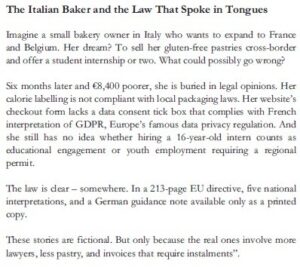Matthias Bauer is a German economist and Director at the European Centre for International Political Economy (ECIPE). In his new book, called “The Deep State Wants a Hug”, he describes why he thinks that cutting bureaucracy in a representative democracy is a near-impossible mission”. Hereunder, he summarizes his new publication for Brussels Report.
***
Every few years, Brussels rediscovers bureaucracy. It usually happens when a new Commission takes office or a Council Presidency wants a slogan that sounds both ambitious and harmless. “Let’s cut red tape,” they say, smiling bravely into the microphones.
The problem? In a representative democracy – in the EU as well as in most modern economies – cutting bureaucracy is about as likely as repealing gravity.

Once a law or regulation is born, it rarely dies. It grows up, marries other regulations, has a few annexes, and retires on a generous pension. It’s not just text on paper – it becomes someone’s income, someone’s funding stream, someone’s legal moat. Bureaucracy is not a side effect of democratic governance. It is an industry.
Entire economic ecosystems depend on it: ministries, regulatory authorities, law firms, NGOs, consultancies, tax advisors, auditors, lobbyists, data protection gurus, military contractors, broadcasters and certification bodies. These groups don’t merely adapt to regulatory complexity – they live off it.
And because they’re well organised, well networked, and very good at explaining why they’re indispensable, no one dares to touch them. Not the left. Not the right. Not the political centre. Politicians quickly learn that “cutting red tape” isn’t like trimming weeds – it’s like threatening someone’s mortgage.
That’s the uncomfortable truth at the heart of my book, The Deep State Wants a Hug – How to Lobby Like Crazy and Make Money by Law. It’s a satirical but very real look at the industries that quietly thrive on legal complexity – and why that makes genuine reform so difficult.
https://twitter.com/Telegraph/status/1990006983076761679
NGOs – Non-Governmental but Always Well Funded
Europe’s NGO landscape is a masterpiece of government engineering. Many NGOs receive the majority of their funding from governments or EU programmes – and then use that money to campaign and consult those same institutions. Fluent in the language of moral urgency and multi-year grant agreements, they are the perfect example of dissent with a budget line.
Net Zero Heroes – The Subsidy Cyclists
Climate policy has no shortage of true believers – but also a large professional class that has turned emissions targets into reliable income streams. Every ambitious climate goal produces a new agency, grant line, reporting obligation or “centre of excellence”. These programmes are rarely pruned; they are simply rebranded and rolled over into the next government funding cycle.
Tax Advisors – Guardians of the Labyrinth
Europe’s tax systems are so complex they require entire professional armies to navigate. Every well-intentioned rule spawns exceptions, clarifications, loopholes and creative structures. Tax advisors don’t just work around the maze – they ensure the maze endures. In many ways, they are the real custodians of Europe’s fiscal state: the only ones who (pretend to) fully understand it.
Data Protection Gurus – Compliance as a Lifestyle
No modern bureaucracy would be complete without its guardians of privacy. Since the introduction of General Data Protection Regulation (GDPR), data protection has transformed from a legal field into a thriving cottage industry. Every vague clause generates billable hours: Data Protection Officers, certification bodies, privacy consultants, law firms, auditors, “awareness trainers” and enforcement agencies have built entire careers on a regulation few fully understand – not even the regulators themselves.
The genius of this ecosystem is its permanence: GDPR compliance is never “done” – it’s an ongoing service model. What began as a rights-based framework now sustains armies of experts who ensure the “spirit of the law” remains as broad (and profitable) as possible.

Tech Visionaries – PowerPoint to Procurement
Innovation funding is one of the great bureaucratic growth markets. The formula is simple: promise transformation, secure grants, assemble a consortium, deliver slide decks and interim reports, and make the programme “too strategic to cancel”. Grand digital strategies may be written in the future tense – but they’re cashed in the present.
Military Contractors – Procurement Without Pause
Few industries have mastered the art of bureaucratic survival like defence. Under the banners of national or European security, programmes rarely end – they simply “phase” into something larger, more urgent and more expensive. No politician wants to be remembered as the one who “cut defence capabilities” – even when projects are decades late or billions over budget.
Certification and Standardisation – The Gatekeepers of Simplicity
The EU has thousands of standards, accreditations and conformity regimes – all designed to “streamline” the Single Market. In practice, each new layer creates new compliance work, new consultancies, new boards, new expert groups. A genuinely simple standard would be a threat to dozens of business models.
None of these actors are villains in the traditional sense. They are rational players responding to rational incentives in a system where laws, once created, almost never die. Cutting bureaucracy isn’t about passing one bold law. It’s about dismantling entire economic ecosystems with stable cash flows and strong lobbying power.
And that’s precisely why no politician dares to touch it: out of decency, ignorance – or very tangible self-interest. Not the left, not the right, not the political centre. It’s easier to promise “simplification” than to tell a well-funded sector its business model is about to end.
The uncomfortable conclusion: bureaucracy in Europe isn’t just sticky – it’s structurally self-reinforcing. Reformers face a system where complexity is both a product and a profit centre.
That’s why deregulation efforts in Brussels always resemble grand opera: a stirring overture, some intricate choreography, a long pause, and then the chorus returns, singing the same tune.
The Deep State Wants a Hug – How to Lobby Like Crazy and Make Money by Law
The book about 20 deep state industries that keep government growing.
Amazon DE: https://tinyurl.com/58bwe5u8
Amazon FR: https://tinyurl.com/m949scu6
Amazon US: https://tinyurl.com/ydp5rhau
Amazon UK: https://tinyurl.com/4zusanb9
https://twitter.com/MatBauerEcon/status/1982709188959834196
Disclaimer: www.BrusselsReport.eu will under no circumstance be held legally responsible or liable for the content of any article appearing on the website, as only the author of an article is legally responsible for that, also in accordance with the terms of use.













